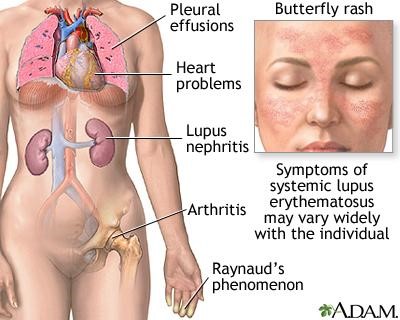A woman with a history of systemic lupus erythematosus comes to the clinic for evaluation. The woman tells the nurse that she and her partner would like to have a baby but that they are afraid her lupus will be a problem. Which response would be most appropriate for the nurse to make?
Be sure that your lupus is stable or in remission for 6 months before getting pregnant.
It's probably not a good idea for you to get pregnant since you have lupus.
Your lupus will not have any effect on your pregnancy whatsoever.
When you get pregnant we'll have to add quite a few medications to your normal treatment plan.
The Correct Answer is A
Choice A Reason: This is correct because this response provides realistic and supportive advice for a woman who wants to have a baby with lupus. Lupus is an autoimmune disease that causes inflammation and damage to various organs and tissues. Lupus can affect fertility and pregnancy outcomes, such as increasing the risk of miscarriage, preterm delivery, preeclampsia, or neonatal lupus. Therefore, it is important for the woman to have her lupus under control before conceiving and to consult with her doctor about her treatment plan and prenatal care.
Choice B Reason: This is incorrect because this response is discouraging and insensitive for the woman who wants to have a baby with lupus. Lupus does not necessarily prevent a woman from having a healthy pregnancy and a healthy baby, as long as she follows her doctor's recommendations and monitors her condition closely. The nurse should respect the woman's reproductive choices and provide information and support.
Choice C Reason: This is incorrect because this response is inaccurate and misleading for the woman who wants to have a baby with lupus. Lupus can have various effects on pregnancy, such as causing flares or complications that can affect both the mother and the baby. The nurse should educate the woman about the possible risks and benefits of pregnancy with lupus and help her prepare for any challenges.
Choice D Reason: This is incorrect because this response is vague and alarming for the woman who wants to have a baby with lupus. Lupus treatment may or may not change during pregnancy, depending on the type and severity of lupus, the medications used, and the stage of pregnancy. The nurse should explain the rationale and safety of any medication changes and address any concerns or questions that the woman may have.

Nursing Test Bank
Naxlex Comprehensive Predictor Exams
Related Questions
Correct Answer is C
Explanation
Choice A Reason: This is incorrect because administering Rho(D) immune globulin 24 hours before delivery is too early and may not provide adequate protection for the fetus. Administering it 24 hours after delivery is too late and may not prevent the mother from developing antibodies against the fetal Rh-positive blood cells.
Choice B Reason: This is incorrect because administering Rho(D) immune globulin in the first trimester is unnecessary and may not be effective, as the risk of Rh isoimmunization is very low before 28 weeks of gestation. Administering it within 2 hours of delivery is appropriate, but not sufficient, as it should be repeated within 72 hours after delivery.
Choice C Reason: This is correct because administering Rho(D) immune globulin at 28 weeks gestation and again within 72 hours after delivery is the recommended schedule for preventing Rh isoimmunization in Rh-negative pregnant women who have Rh-positive partners. This regimen can prevent up to 99% of cases of Rh isoimmunization by blocking the maternal immune response to the fetal Rh-positive blood cells.
Choice D Reason: This is incorrect because administering Rho(D) immune globulin at 32 weeks gestation is too late and may not prevent Rh isoimmunization if there has been any fetal-maternal hemorrhage before that time. Administering it immediately before discharge is also too late and may not prevent the mother from developing antibodies against the fetal Rh-positive blood cells.
Correct Answer is ["C","D","E"]
Explanation
Choice A: Absence of pain is not a sign of abruptio placenta. Abruptio placenta is a condition where the placenta separates from the uterine wall before delivery, causing bleeding and pain. The pain is usually severe and constant.
Choice B: Insidious onset is not a sign of abruptio placenta. Abruptio placenta is usually a sudden and acute event that occurs in the third trimester or during labor.
Choice C: Dark red vaginal bleeding is a sign of abruptio placenta. The bleeding is caused by the rupture of blood vessels between the placenta and the uterus. The blood may be dark red because it is old or clotted.
Choice D: Rigid uterus is a sign of abruptio placenta. The uterus becomes hard and tense as a result of the bleeding and contraction of the uterine muscles. This can impair the blood flow to the fetus and cause fetal distress.
Choice E: Absent fetal heart tones is a sign of abruptio placenta. The loss of blood and oxygen to the fetus can cause fetal death or stillbirth. Fetal heart tones can be detected by using a Doppler device or a fetoscope.
Whether you are a student looking to ace your exams or a practicing nurse seeking to enhance your expertise , our nursing education contents will empower you with the confidence and competence to make a difference in the lives of patients and become a respected leader in the healthcare field.
Visit Naxlex, invest in your future and unlock endless possibilities with our unparalleled nursing education contents today
Report Wrong Answer on the Current Question
Do you disagree with the answer? If yes, what is your expected answer? Explain.
Kindly be descriptive with the issue you are facing.
